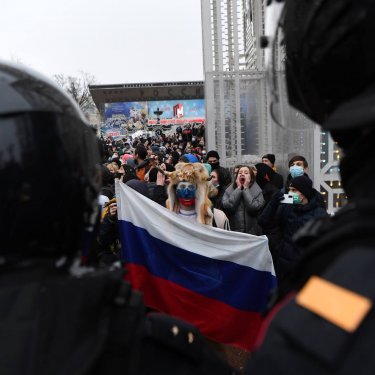More intimidation of journalists ahead of second round of pro-Navalny protests

Russian journalists are being subjected to “preventive visits” and searches of their homes – and some others to criminal proceedings – ahead of a second round of demonstrations in support of jailed Kremlin opponent Alexei Navalny tomorrow.
Reporters Without Borders (RSF) condemns these serious press freedom violations and urges the authorities to end the wave of harassment of the media that began after Navalny’s return to Russia on 17 January.
In the wake of the pro-Navalny demonstrations on 23 January, police searched the home of Sergei Smirnov, the editor of Mediazona, a leading online source of reporting on police and judicial abuses, on 27 January and confiscated the hard disk of his computer.
Other journalists have received “preventive visits”, including Tikhon Dzyadko, the chief editor of the independent TV channel Dozhd, whose Moscow home was visited on 25 January, and Sofia Rusova, a Moscow-based journalist who specializes in the environment and is member of the Journalists and Media Workers Union (JMWU).
“These orchestrated intimidatory operations are utterly arbitrary and counter-productive,” said Jeanne Cavelier, the head of RSF’s Eastern Europe and Central Asia desk. “The media must not be the collateral victims of what is an entirely unjustified witch-hunt against government opponents. We call on the authorities to end this intimidation and to punish those responsible for these pressures against journalists.”
On 28 January, police went to the home of Elena Solovyova, a Novaya Gazeta reporter who had covered the pro-Navalny demonstrations on 23 January, in order to inform her that she was being prosecuted for “participating in an unauthorized demonstration.”
When the young reporter Margarita Murakhtaeva’s relatives in Nizhny Novgorod received a visit from the police on 27 January, they were told she was being prosecuted for “participating” in a demonstration she had covered. Murakhtaeva works for Koza Press, a local news website founded by her mother, Irina Slavina, a journalist who took her own life by setting herself on fire last October after repeated harassment by the local authorities.
Dozens of criminal cases have been initiated in Moscow in another disturbing sign of increasing authoritarianism. At least four journalists have been charged with “violating public health norms” because they urged Russians to participate in the demonstrations. They include Mediazona publisher Piotr Verzilov, sports presenter Nikita Belogolovtsev, and Tatiana Felgengauer, a reporter for Echo of Moscow, an independent radio station.
Repression is also intensifying in Russia’s far-east, where two journalists who have been covering protests against a local governor’s detention were convicted yesterday of “participating in an unauthorized demonstration.”
Russia is ranked 149th out of 180 countries in RSF's 2020 World Press Freedom Index.



